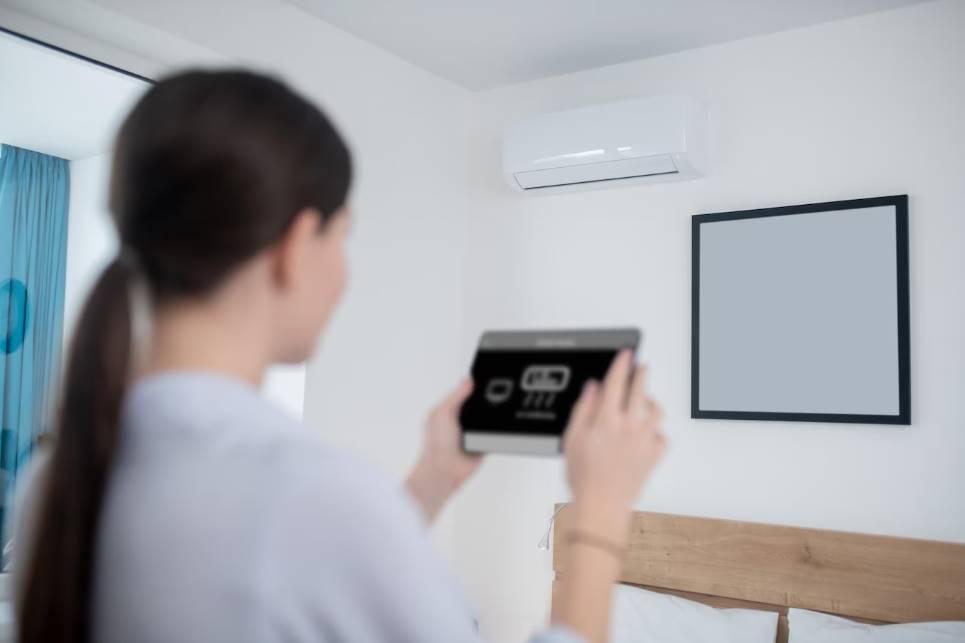Fewer people in the past might have contemplated installing a central air conditioning system in their homes or smaller businesses. However, it may have changed now. Because of its benefits, central air conditioning may have been a popular choice for many houses. However, there are more considerations before this.
Air conditioning systems that distribute cool air throughout a building use an exterior condenser, an internal control unit, and ductwork.
Unlike a standard AC unit, each room's unit must be individually turned on. There won't be any refreshing breezes in there without an air conditioner.
In this post, we'll look at the pros and cons of installing central air conditioning.
What are Centralised Air Conditioning Systems?
A ductless or ducted central air conditioner can effectively chill an entire house. The warm air from within the house is sucked into the system, cooled, and recirculated through the same ducts. People who want an easy and reliable solution to keep their homes at a suitable temperature often choose these systems.
Let's examine the benefits and drawbacks of central air conditioning for homes to help you decide if it fits your best.
The Benefits of a Centralised AC System in a Home
Energy Efficiency: Save Money And Stay Cool
Due to their efficiency, central air conditioners save a lot of money on utility bills. These systems are made to replace many window or portable air conditioners, saving you money on utility bills while cooling your entire home. Central air conditioning allows for a pleasant environment without the associated high cost.
No More Hot Spots Thanks To The Uniform Temperature Distribution
The most obvious benefit of central air conditioning is year-round comfort. When your home's central air conditioning is in good working order, you won't have to worry about the weather outside.
And it's not confined to a single room! All of your home maintains a constant, pleasant temperature. This is the main benefit of central air conditioners over standard air conditioners. When you turn on your air conditioner, the entire house instantly cools to the preset level.
The Air Quality Has Improved So That You Can Relax
Many centralised HVAC systems have in-built air filtration technologies that vastly enhance indoor air quality. They can remove contaminants from the air, such as dust, allergies, and pollution. Central air conditioning might be a lifesaver if you or a family member suffers from allergies or respiratory problems.
Pay attention to the quality of the air where you live and work is crucial. Maintaining peak physical fitness is essential. Poor air quality increases respiratory disease risk first and foremost.
One of the main benefits of central air conditioning is that the air is filtered as it is pumped through the ducts. It means fewer allergens and possibly dangerous particles will float about in your house's air.
Easy Access And Individualised Care For Superior Relaxation.
When you install central air conditioning, you may regulate the temperature wherever you want in your house. The temperature in each zone or room can be individually controlled. Many modern systems are app-enabled, letting you set the temperature remotely.
Smooth Running: Calm And Relaxing
Central air conditioning systems are quieter than their window counterparts. There won't be any annoying buzzing or rattling to bother you. Because of this, you can relax in silence and comfort indoors, away from the day's heat.
Downsides of Home AC Centralisation
Humidity Elimination
When the humidity is extreme, even the hottest summer days are intolerable. Humidity is nothing new for Australians, and it's taking a toll on their health. Humidity levels in the 30–50% range are prefered. While outside humidity is beyond anyone's control, an air conditioner may greatly reduce indoor humidity.
Fans become almost useless when the weather is hot and humid; not even lounging around half-naked will provide relief. A dehumidifier is an additional benefit of having an air conditioner in your home. You can use an air conditioner with fewer drawbacks or buy a dehumidifier.
Humidity in the air traps heat and prevents air from cooling your home. Therefore, your home must have an efficient way of removing humidity from the inside. In hot and humid climates, a home's ductwork must efficiently extract the hot and humid air from the living space.
The Ability To Regulate The Temperature In Each Room Is Limited.
A centralised system distributes cooled air throughout your home via ducts. It makes it possible to cool the entire room.
If you don't have temperature control concerns in some parts of your home, this fact won't cause you any trouble. Some areas of your house may be unusually cold or warm. A different temperature setting is required to maintain a comfortable temperature there than in the rest of your home.
A central air conditioning system may constrain individual room temperature management.
Expensive To Begin With
Central air conditioning systems can save money in the long run but are more expensive to set up initially. You must spend money on machinery, ducting, and expert installation. The initial investment may seem high, but the comfort and energy savings that homeowners enjoy more than make up for it.
Installation costs vary by home size, system type, and region. It might be upwards of $10,000.
Installation Difficulty
Central air conditioning systems are not a "do it yourself" project. Skilled labour is needed to guarantee adequate sizing, installation, and sealing. Doing the installation independently can lead to more efficient and affordable problems.
There Is A Need For Ductwork
The ductwork is usually the deciding factor. If you already have a duct system in your home (from a furnace system, for example), installing central air conditioning is as simple as connecting the ducts.
But if you don't, you should know that putting in ductwork is a huge remodelling that requires demolishing walls and tearing up floors. It's a big investment that will pay off in the end by raising the value of your property, but getting there will need some forethought and careful budgeting.
Running Smoothly: Maintenance Costs
Central air conditioning systems need regular maintenance like any other mechanical equipment. Filters should be cleaned or replaced as needed, and leaks and proper operation of all parts should be verified. Maintaining your system is important, but the prices can pile up over time.
Impact On The Environment: Chill Out, But Be Cautious
Refrigerants used in centralised air conditioning systems harm the environment if released improperly. Scheduled maintenance is crucial for locating leaks as soon as possible and repairing them. To further lessen your impact on the planet, think about using systems that employ eco-friendly refrigerants.
Effects Of Loss Of Electricity Supply
Central air conditioners will be useless during a blackout without a backup generator. This could make you uncomfortable in the heat if the power goes out. Backup generators and secondary cooling systems should be in place.
Use Of Too Much Energy
A central air conditioner uses more power than individual room air conditioners since it must remain on until the house achieves a predetermined temperature. If warm air enters the house through any of the openings, it will need to operate constantly. This can significantly raise your electric bill.
You can easily make an educated decision while installing a central air conditioning unit in your home by considering the pros and downsides discussed in this article.
Is It the Best Option to Have Central Air Conditioning?
There are many benefits to using central air conditioning instead of other cooling methods. Energy efficiency is crucial for many house owners. Central air conditioning saves money on utility bills since it requires less energy to achieve the same cooling effect as window or wall units.
As a bonus, central air conditioning eliminates the need to remember to turn on individual air conditioners throughout the house. Instead, it allows you to do so from a central location. With a central air system, the compressor and other components are located outside the house, and the ducts are concealed within the walls. Finally, central AC systems boost property value, typically more than cost.
Only some things about central air conditioning are perfect. The most significant drawback of central air conditioning is the high price tag if your home still needs ducting for the heating system. Lastly, a sizable outdoor condenser is needed for central air conditioning. The condenser can be an eyesore, and it may be too expensive to move it from its current location in the yard to the location of your electrical panel.
Not every home needs central air conditioning, but for many people, the advantages and cost savings are worth it. If you're considering installing central air and want more information or a price estimate, don't wait until summer to contact our seasoned pros.
Central air conditioning is the way to go for maximum convenience and low operating costs. A centralised system that regulates the temperature throughout the house is more efficient than many window units. However, there may be significant roadblocks, such as cost, ducting installation and maintenance worries, and rising energy costs.
New air conditioners are expensive, so take them seriously. Consider the ongoing expenditures of upkeep and energy usage, and then make a call.
To sum up, centralised home air conditioning systems have many advantages. These advantages include reduced energy use, uniform temperature distribution, higher air quality, and simple operation. They have drawbacks, including expensive initial expenses, skilled installation and upkeep, and environmental problems.
The preceding review of central air conditioning's benefits and drawbacks should help you decide whether to install one in your home or building.
Remember that there is no "best" method of home cooling while choosing. It just comes down to which option you like more and how pressing your needs are.
When deciding on a central air conditioner for your home, the most important thing to remember is to do your research.
Conclusion
Central air conditioners are widely used because they are cost-effective to run, provide for consistent temperatures throughout a building, enhance air quality inside the building, and are simple to access and operate. They can help you save money on your power costs, keep you comfortable all year long, and have built-in air filtration systems that get rid of allergens, pollen, and dust. Temperatures can be set individually for each zone or room with a central air conditioning system, allowing for utmost comfort and convenience.
Central air conditioning systems have several disadvantages, however. Particularly in hot and humid locations, humidity can pose serious problems. An air conditioner with a dehumidifier is a great addition to any home. Ductwork in hot and humid conditions needs to be able to quickly and effectively remove stifling air.
It may be difficult to maintain a consistent temperature throughout a house with a central air conditioning system because each room would need to be activated separately. In regions with extreme cold or heat, this might be an issue because individual rooms may need to be kept at various temperatures.
In conclusion, there are several advantages to installing a central air conditioning system, such as reduced energy consumption, year-round comfort, higher IAQ, simple accessibility, and silent operation. There are, of course, drawbacks, such as a lack of fine-grained temperature control and the possibility of a lack of control over one's own room's temperature.
In addition to being cost-effective and convenient, central air conditioning systems also help the environment. However, they can be costly to install initially due to the need for specialised labour, ducting, and professional set up. Ductwork is typically the decisive factor in an otherwise difficult installation. To avoid malfunctions and leaks, routine maintenance is essential.
Refrigerants used in central air conditioning systems can be harmful to the environment if used incorrectly. Having a secondary cooling system and backup generator is crucial in case of a power loss. Furthermore, central air conditioners require more energy, leading to higher electrical bills.
Central air conditioning is an unnecessary luxury in certain cases, but for those who can benefit from it, it's well worth the money. Significant limitations exist, however, including the high cost of ducting installation and the requirement for a sizable external condenser.
In conclusion, there are several reasons why you might want to consider installing a central air conditioning system in your home. There are, however, downsides to these technologies, including their high initial prices, the need for expert installation and maintenance, and potential environmental impacts. Do your homework and pick the best option for your house or office.
Content Summary
- In the past, there were fewer people who gave central air conditioning serious consideration.
- Because of its many advantages, central air conditioning has been gaining more and more popularity.
- Before putting in a central air conditioning system, there are certain things to think about.
- Ductwork, an outside condenser, and an inside control unit are the three components that make up a central air conditioning system.
- When using central air conditioning, each individual room unit requires its own independent activation.
- This article examines the advantages and disadvantages of having central air conditioning.
- Air conditioning systems that are centralised have the ability to chill a whole home.
- The ducts that were previously used to cool and recycle warm indoor air are reused.
- The installation of central air conditioning can result in financial savings as well as energy efficiency.
- The temperature is maintained at a constant level throughout the entire house thanks to the central air conditioning system.
- Another one of the benefits is an improvement in the air quality inside.
- The temperature in each zone or room can be controlled independently thanks to the central air conditioning.
- Apps allow for the remote manipulation of a large number of today's technologies.
- The operation of central air conditioning systems is completely silent.
- Extreme conditions can make humidity unbearable to the human body.
- The use of central air conditioning can contribute to a decrease in the amount of humidity found within.
- The ability to alter the temperature in each room is restricted.
- Installing centralised air conditioning comes with an upfront financial investment.
- Installation necessitates the use of labour performed by skilled individuals.
- It's possible that you'll need ductwork, which is a substantial undertaking for any remodelling project.
- It is essential to do routine maintenance, but doing so will incur continuous costs.
- There is potential for environmental damage caused by the usage of refrigerants in central systems.
- In the event that the power goes out, central air conditioners will not function properly.
- Individual air conditioning devices use less power than central air conditioning systems.
- Both cost reductions and energy efficiency should be taken into consideration when choosing a central air system.
- Individual room air conditioners are rendered unnecessary by the installation of central air systems.
- They have a covert condenser that is located outside.
- The high cost is the primary disadvantage, and it only applies if ducting is required.
- When selecting a central air conditioner, doing your research is absolutely necessary.
- When it comes to cooling a home, there is no "one size fits all" approach.
- The temperature may be maintained at a consistent level thanks to the central air conditioning.
- Because it has built-in filtration, it makes the air in the house healthier.
- Each room has its own unique thermostat that regulates the temperature.
- These days, most devices can be controlled from a remote location.
- The operation of central air conditioning systems is quite silent.
- The use of central air helps bring the relative humidity inside down.
- There is a potential cause for concern regarding the limited temperature regulation in certain rooms.
- The price of installation for central air conditioning might be quite considerable.
- The use of energy and the cost of maintenance are also factors in ongoing costs.
- When choosing a central air conditioner, doing your research is absolutely necessary.
Frequently Asked Questions About Air Condition
Central air conditioning is a cooling system that uses an exterior condenser, an internal control unit, and ductwork to distribute cooled air throughout a building. It works by pulling warm indoor air into the system, cooling it, and then recirculating the cooled air through the ducts to maintain a comfortable temperature in all rooms.
Central air conditioning offers several advantages, including energy efficiency, uniform temperature distribution, improved indoor air quality, and individualized temperature control in each room. It also eliminates the need for individual room units and operates quietly.
Some drawbacks of central air conditioning include the initial high installation costs, the need for skilled labor and, in some cases, ductwork installation. Maintenance and energy usage can also contribute to ongoing expenses. Additionally, central air systems may not effectively eliminate humidity in all cases.
Central air conditioning may not be necessary for every home. The decision depends on factors like personal preferences, budget, and the existing HVAC infrastructure in your home. Research and consultation with professionals can help you determine if central air conditioning is the right choice for your property.
When selecting a central air conditioner, consider factors such as the system's energy efficiency, installation costs, ongoing maintenance requirements, and environmental impact. It's essential to research different models, consult with HVAC experts, and assess your specific cooling needs to make an informed decision.



